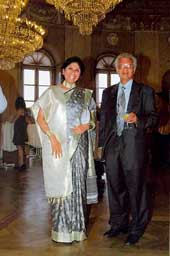|
|
| Well said |
PEOPLE ON PEOPLE: THE OXFORD DICTIONARY OF BIOGRAPHICAL QUOTATIONS Edited by Susan Ratcliffe, Oxford, Rs 595
HISTORY IN QUOTATIONS REFLECTING 5000 YEARS OF WORLD HISTORY By M.J. Cohen and John Major,
Cassell, £18
A character in a James Thurber short story made the statement that she didn’t like Hamlet because it was full of quotations. Oscar Wilde once told the painter, James Whistler, “Wish I had said that.” To which Whistler replied, “You will, Oscar, you will.” Wilde was known to speak in quotations: the well-prepared epigram, the perfect barb and the inimitable art of inverting the accepted reality. “Anybody can make history. Only a great man can write it”, he wrote. Following that, one could say that doing something memorable is easy, saying something memorable is achieved by only a few.
These two books — the one on quotations about history is a real doorstopper, running as it does to over a thousand pages — bring together some of the choicest passages and bons mots. Most of the old chestnuts are here, of course (for example, Dorothy Parker on Katharine Hepburn: “She ran the whole gamut of emotions from A to B’’), but there are very many new ones. (John Gielgud on Ingrid Bergman: “Dear Ingrid — speaks five languages and can’t act in any of them.’’)
Reading these two books, well-edited and well-arranged, is akin to eating off a smorgasbord. One does not have to follow a set pattern — from aperitif to cheese. One can begin anywhere one likes. If you want to stuff yourself with lines from Wilde or with quotable quotes on the Cold War, you can begin and end there. These books do not stand on form, the strict ritual of a sit down dinner or intensive reading of a book from cover to cover.
The most-quoted book in the world, The Bible, gets left out because it is authorless. Shakespeare comes a close second. People on People (“John Major, one of the editors, is not the ex-PM since he never uttered a memorable sentence.”) has a clutch of quotes on the bard. Laurence Olivier, than whom nobody spoke better Shakespeare’s lines, said of him, “Shakespeare — the nearest thing in incarnation to the eye of God.’’
Others, in different realms of activity, have also wandered into the field of idolatry. Take two instances from two vastly different areas. Mozart said of Beethoven, when the latter was only 17 years old, “Keep your eyes on him; some day he will give the world something to talk about.’’ The other is from soccer. Matt Busby, the famous coach of Manchester United, once said of his pre-match talk to the team: “All I said was, whenever possible, give the ball to George.” The reference, for the uninitiated, is to George Best.
History is full of quotations, from those who made history and from those who read about it. A running debate has concerned history-writing’s relationship with truth. Most mainline historians have upheld history as the pursuit of truth. But Trevelyan, by any reckoning a mainliner, said in his inaugural lecture as Regius Professor of Modern History at Cambridge, “On the shore where time casts up its stray wreckage, we gather corks and broken planks, whence much needed may be argued and more guessed; but what the great ship was that has gone into the deep, that we shall never see.’’
It would appear from this passage, not quoted too often, that post-modernists have merely been echoing (not actually quoting from) Trevelyan. Welcome then to the table. It is all here from consommé to petit four.











